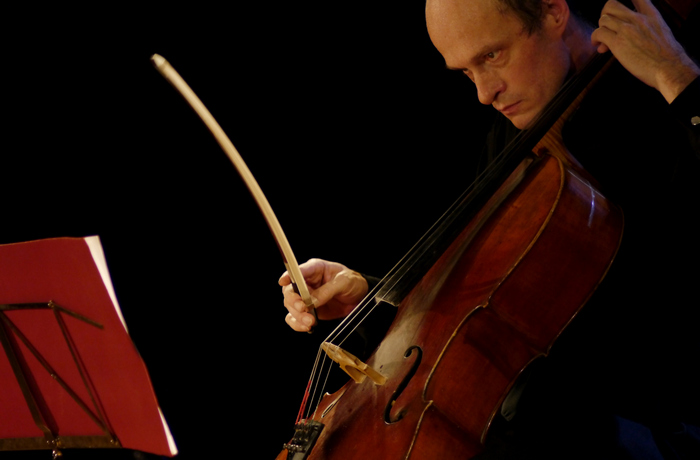
Programme:
Iannis Xenakis: Nomos Alpha (1966)
Petr Bakla: Something with something else III (2014) – PREMIERE!
Iannis Xenakis: Nomos Alpha (1966)
Matthias Lorenz – cello
A solo recital by the German cellist Matthias Lorenz, member of Ostravska banda, is a spring prelude to the August Ostrava Days festival, and at the same time a follow-up to Petr Bakla’s lecture Iannis Xenakis – the myth and the music that took place at Plato last year.
Iannis Xenakis, as a key protagonist of the post-WWII musical avant-garde, features quite frequently in the program of the Ostrava Days festival. Besides his compositions for orchestra and similar large arrangements, all of his pieces for solo string instruments – and these works represent a very important chapter in Xenakis’s oeuvre – have been heard in Ostrava over the years. All but one! Nomos Alpha is seldom performed live, as it requires not only Xenakis’s standard (read: extreme) demands on the performer, but also some rather drastic retuning of the cello during the performance. The piece belongs to Xenakis’s “wild period”, when the composer was extensively seeking to further expand his already entirely original musical language. In Nomos Alpha we hear Xenakis at his best, as a maximalist of raw sound worlds – but add to it an array of mesmerizing details and innovations that only can fully flourish in chamber music contexts. The 15-minute piece will be played twice at the concert, the second round being preceded by Lorenz and Bakla in dialogue about Nomos Alpha and Xenakis in general, this time mostly from the performer’s point of view.
Speaking about his piece, Petr Bakla says: “The purist in me is most happy when a musical idea or a situation permits only one single instrumentation solution, when all the embarrassing decorator-like concerns (which instrument should play what) just don’t take place, because there is simply no other way how to do it. Something with something else is almost there: while it is entirely clear that the music has to be played on either violin, viola or cello, you will not find a single reason why precisely one of these, and not the other two. It therefore exists in three versions that are each a materialization of one and the same principle (one “meta-piece”, if you will), but they don’t share any material, they are different to the last note. Of course it would have been possible to simply transpose, but that is far beyond what my self-worth could stand. Thus, after finishing the piece, I had no choice other than writing it again, and then once more – a particular experience, definitely. According to all sensible criteria, the piece is in a simple ABA form, but I can’t help hearing it as a diptych. Something else wedges into the middle of something, while this something has never ceased to be present in fact, it only temporarily receded somewhere “behind sound”. What a similarity with the whole program of today’s concert…”
Iannis Xenakis (1922–2001) was a composer of Greek origin, but he spent his entire artistic career in France, where he fled persecution for having taken part in an uprising after World War II. Holding a degree in civil engineering, in Paris he first worked at the studio of the architect Le Corbusier, where he co-authored some architectural designs and realizations. Xenakis came to the world of music as an outsider lacking the requisite education and training (he was encouraged only by Olivier Messiaen) but within a few years he became one of the most influential and original composers. Xenakis’s approach to music differed markedly from the conception of his contemporaries who were generally developing the post-Webern idiom, or some other musical tradition. More than the intellectual world of Europe in recent centuries, it was the philosophers of pre-classical antiquity who interested Xenakis. He drew inspiration from mathematics, physics, and natural processes. For him, music was above all a sound synthesis in the most general sense, and he conceived it in categories of density, discreteness or continuity, ratios of periodic (tonal) and non-periodic (noise) components of sound, and similar “non-musical” concepts. Corresponding to his extra-musical inspiration is the radically new expression of Xenakis’s music: it is brutally objective, non-psychologizing, and independent of traditional forms. Xenakis’s oeuvre is characterized by a noteworthy continuity. His first compositions already contain the principles that he developed and elaborated upon throughout his life. Although most of his compositions set almost unbelievable demands on musicians, Xenakis’s music has attracted outstanding performers from the beginning, and few composers have pushed the limits of possibility to the extent that Xenakis has.
Petr Bakla (*1980) is a composer born and based in Prague, but of special importance for him has been the collaboration with the Ostrava Center for New Music. He devotes himself exclusively to creation of notated music for acoustic instruments, from solo to orchestra. In his compositions, he is interested in constructing situations and structural contexts in which elementary musical materials can acquire an unusual expressiveness and energy. A frequent feature of Bakla’s music is a simultaneous course of two or more sound layers whose interaction produces a characteristic tension.
Matthias Lorenz (*1964) studied at the University of Music in Frankfurt am Main. The main focus of his work, both theoretically and artistically, is on contemporary music. Solo performances and radio productions have brought hin into many European countries and since 1996 he has played three productions with the Frankfurt Ballet (Bill Forsythe). This is completed by expeditions into rock, pop, improvised and electro-acoustic music. 2001 he founded the elole-pianotrio, since 2003 he is member of the Dresden based ensemble courage and in 2011 he joined Ostravská Banda.
Admission 60 CZK/80 CZK/100 CZK
